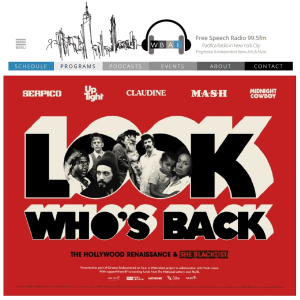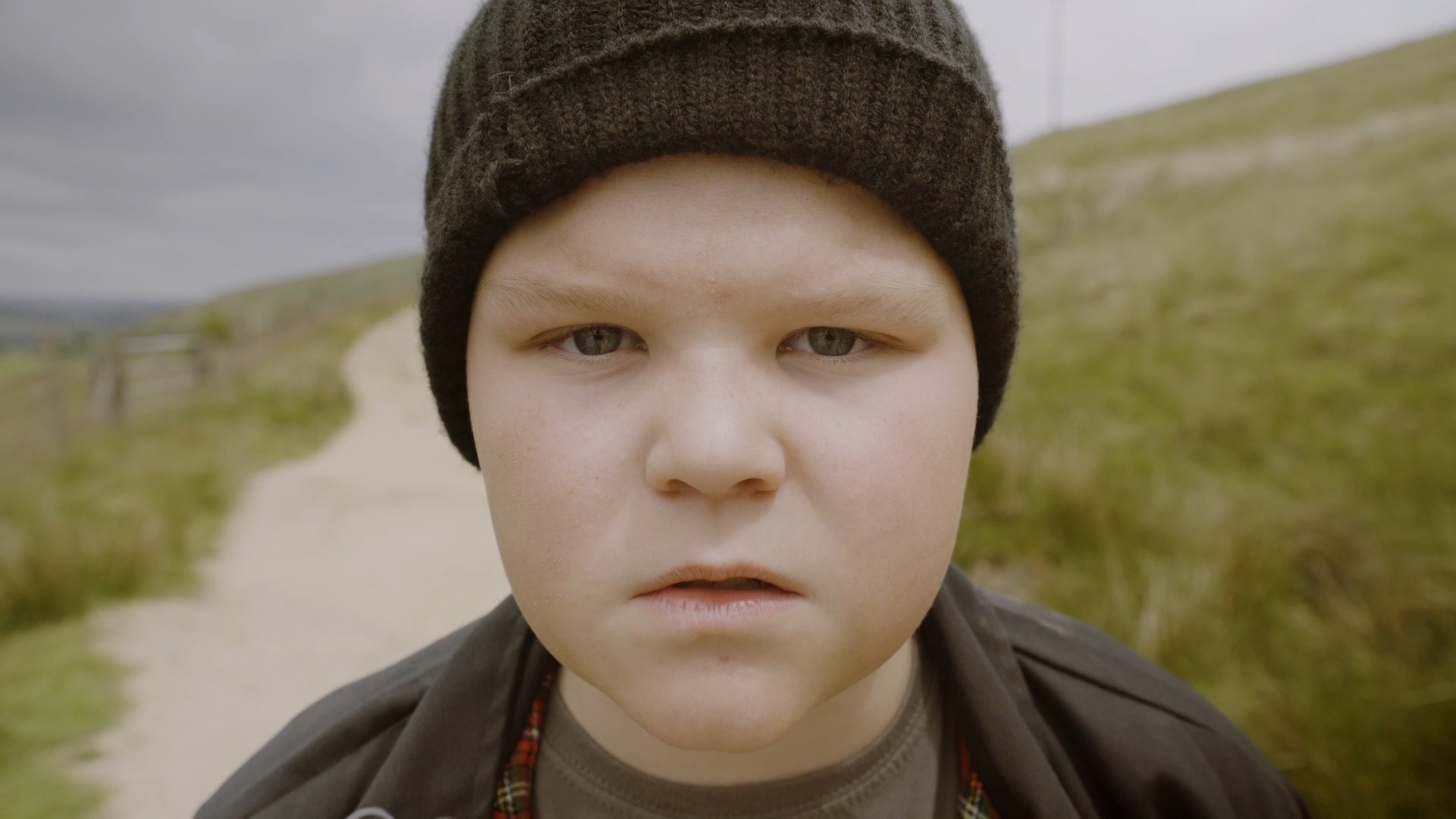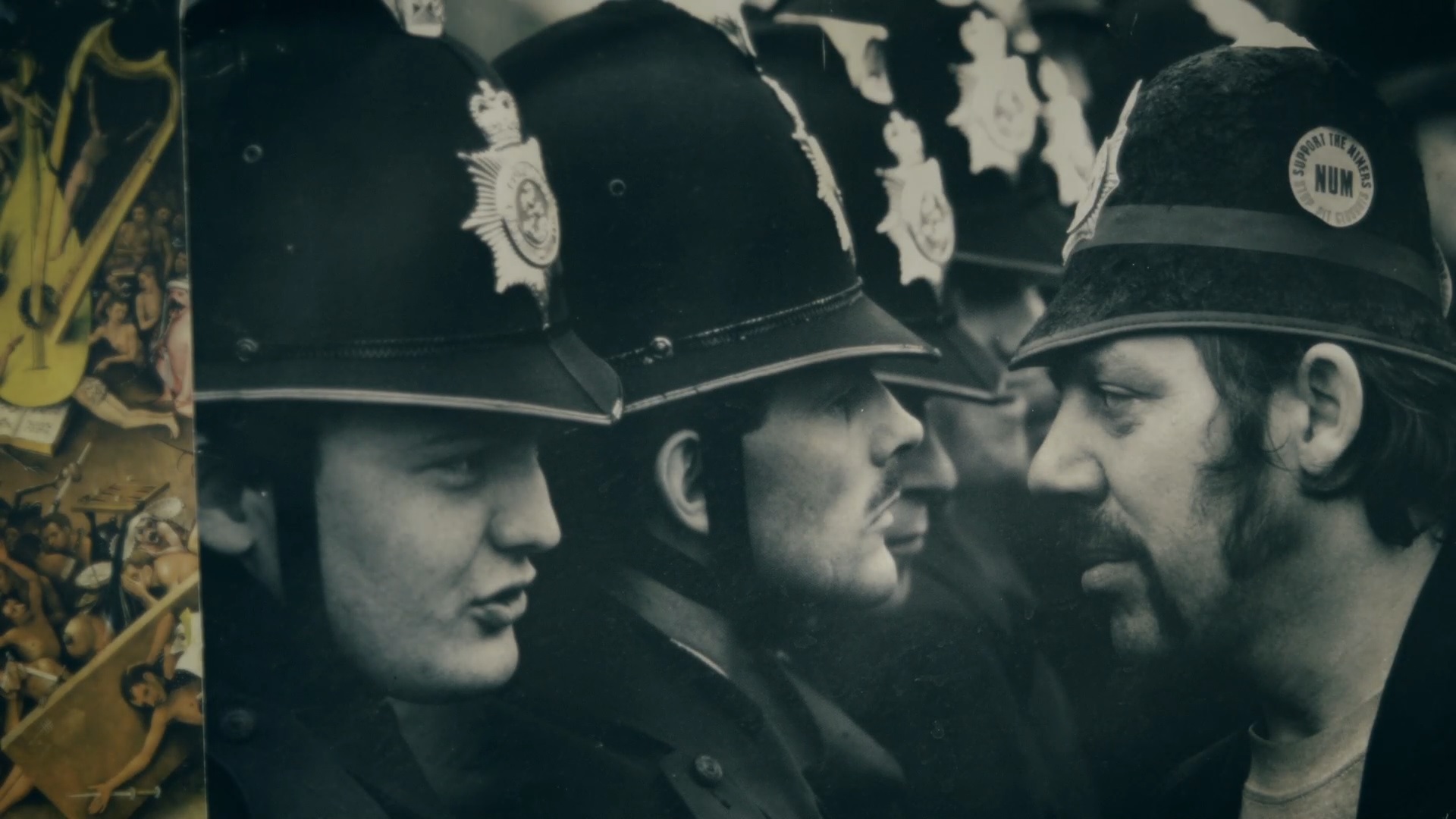
The Hollywood Renaissance and The Blacklist
Brett Gregory interviews Dr. Andy Willis, Professor of Film Studies at the University of Salford (UK), for Arts Express
Brett Gregory: Hi, this is the UK desk for Arts Express, and I'm Brett Gregory. My guest this evening is the curator of a unique season of controversial yet compelling Hollywood movies from the 1960s and seventies. In collaboration with National Film Festival organisers Cinema Rediscovered, global distribution company Park Circus, and the esteemed British Film Institute, will be touring cinemas in the UK and the Republic of Ireland over the next two weeks.
Andy Willis: Hi Brett, thanks for having me on the show. My name is Andy Willis. I'm a professor of film studies at the University of Salford in the UK. Alongside that, I'm also a senior visiting curator for film at HOME, which is a multi-arts centre in the middle of Manchester in the North West of England.
BG: And what is this curated film program, this creative project, about exactly?
AW: So, this project is on the Hollywood blacklist, but particularly on how those people who were involved in the Hollywood blacklist ended up going back into the American film industry in the 1960s. It's particularly focused on those who contributed in the broader sense to what's now known as the Hollywood Renaissance. It went really from the early stirrings of the Hollywood blacklist, which began at the end of the Second World War. In the trade papers within the film industry, such as the Hollywood Reporter, articles began to appear accusing people who worked in the Hollywood film industry of having communist sympathies. This is quite ironic, seeing as when the Soviet Union was an ally, many people were encouraged to make pro-Soviet films. But after the war, when they were now the enemy, suddenly those films were held against people when they were accused of being communists or communist sympathisers. This came to a peak in October 1947 when The House Committee on Un-American Activities Committee, often known as HUAC, subpoenaed 19 people to appear before them to be questioned about their loyalty and communist sympathies.
BG: Reds under the bed. So initially, you say 19?
AW: They actually called only 11 people, and one of those people was the playwright Bertolt Brecht, who did talk to the committee. But then, realising that the writing was on the wall, very soon after, he got a plane to East Germany and had one of the most legendary careers in European theatre. The 10 who were left were all held in contempt of the committee and were eventually sent to prison for a year. They became known as the Hollywood 10, which included mostly writers, but also a couple of directors and writer-producers. I think that reflects how influential and important writers were seen at the time within the Hollywood film industry. It was the writers who could put ideas within the films.
BG: And then what happened?
AW: Things got worse just after that. In 1947, there was a statement made by key people in the Hollywood film industry, known as the Waldorf Statement. They met at the Waldorf Hotel. People like Louis B. Mayer from Metro Golden Mayer, Samuel Goldwyn, Harry Cohn from Columbia Pictures were in attendance. They all came together and said that if they had anyone working for them under contract who was seen to be a communist sympathiser or a Communist Party member and didn't renounce that, then they would terminate their contract. That started the Hollywood blacklist.
BG: All very sinister. And there was some sort of in-your-face propaganda campaign going on as well, wasn't there?
AW: Very shortly afterwards, in June 1950, there was the publication of a pamphlet by Counterattack called 'Red Channels.' 'Red Channels' really stuck the boot in even more to progressive practitioners within the Hollywood film industry. It named 151 actors, writers, musicians, as well as broadcast journalists and other people working in the media. After they were named, they were effectively blacklisted and unable to work.
BG: And how long did this reign of terror go on for?
AW: It lasted for a good 10 to 15, for some people coming up to 20 years, where they were unable to work. They were unable to have their names on films or television programs they wrote. It's a very dark period for Hollywood and caused great rifts that lasted for decades after, with people not being happy with those who had named names. One of the things people may know is that as part of the HUAC trials, people would be invited to name names of Hollywood's communists or communist sympathisers. Famous people like Elia Kazan, the theatre and film director, did name names, which caused great disruption in their working relationships. For example, Kazan worked a lot with Arthur Miller, and after he named names, Miller refused to work with Kazan again. When Elia Kazan was given a lifetime achievement Oscar, people like Ed Harris and Nick Nolte were sitting on their hands, not clapping and looking stony-faced. Outside, people like Abraham Polonsky, the writer-director, and Walter Bernstein, the writer, were protesting about giving a lifetime achievement Oscar to someone who had named names and destroyed the careers of many of their friends and work associates.
BG: Yeah, I watched that ceremony with Ed Harris and Nick Nolte on YouTube years ago. Totally awkward. Anyway, let's move on to the films you selected for the program.
AW: One of the key films we chose for the season was 'Serpico' from 1973. It's directed by Sidney Lumet, with a stellar performance by Al Pacino. But what people may not know is that the first early drafts of the screenplay were written by Waldo Salt, who had been blacklisted. Another film we selected was 'Midnight Cowboy' from 1969. It's really the film that brought Waldo Salt back into focus. He had made a couple of other films after his blacklist, notably 'Taurus Bulba' from 1962. But he was unhappy with those kinds of adventure films and wanted to do something more weighty. When John Schlesinger and Jerome Hellman were looking for someone to adapt the novel, it was Waldo Salt who found a way to do that.
BG: Midnight Cowboy is a great film, but why is it a key film for this program?
AW: It is still the first X-rated film to win the Best Film Oscar. Waldo Salt was also rewarded with an Oscar for his work on the film. This seemed to be an important film, emblematic of the new Hollywood and its challenging ideas. I wanted to highlight that Waldo Salt, who suffered from the blacklist era, was able to contribute to the progressive politics of a film like 'Midnight Cowboy.'
BG: Tell us more about the movie 'Uptight.' I've never heard of it.
AW: 'Uptight' is an interesting example among the films in the season. It's much lesser known than 'Serpico' or 'Midnight Cowboy.' It's directed by Jules Dassin, who was also blacklisted in the early 1950s. He moved to Europe and rebuilt his career there, known for 'Rififi.' 'Uptight' was the first film he made back in America. It's an adaptation of the same novel that John Ford adapted for 'The Informer' in the 1930s. Jules Dassin, who suffered from the blacklist, I think was interested in this idea of the guilt at the core of this film.
BG: And there were political shenanigans going on behind the scenes, is that right?
AW: It's a fascinating film, but the making of the film is also really interesting. Shot in Cleveland, there was so much tension among the extras that they had to take the production back to Los Angeles. The FBI reportedly tried to get people working on the film to inform them about the politics of the film. Jules Dassin takes the setting from Ireland and the IRA of the original novel and places it into the Black Power movement in Cleveland in the late 1960s. It's a fascinating film.
BG: Black Power, the IRA. What else do you have lined up?
AW: Yes, another film that focused on the Black experience in America and had a contribution from someone blacklisted is 'Claudine.' It's a much smaller, quieter film set in Harlem around a single mother played by Diahann Carroll. She meets a well-meaning garbage man played by James Earl Jones, and they try to make a go of things in 1974. The film is directed by John Berry, who had been blacklisted and went on to work on this film. It's an important historical film, I think, and has been a little forgotten.
BG: A film that hasn't been forgotten, though, is Robert Altman's 'M*A*S*H.'
AW: 'M*A*S*H' is another familiar film in the season. It's remembered for breaking Robert Altman and introducing his filmmaking style, with sound and image combining in a unique way. For this season, 'Look Who's Back: The Hollywood Renaissance and the Blacklist,' I wanted to focus on the screenwriter of 'M*A*S*H,’ Ring Lardner Jr. He had been one of the Hollywood 10, one of the first victims of the blacklist.
BG: Why is Ring Lardner Jr.'s work on 'M*A*S*H’ so important?
AW: Ring Lardner Jr.'s contribution was vital to 'M*A*S*H.’ He brings progressive politics and attempts to portray the horrors of war. It also looks forward to the cynicism of the 1970s. 'M*A*S*H’ is one of the great anti-war movies. America was still in the thrall of Vietnam in 1970, and I don't think anybody needed any pushing to relate the film to the Vietnam reality that many Americans were experiencing.
BG: And you focus on a particular female actor in your program as well, don't you?
AW: Yes, I didn't want to focus only on writers. I included Hal Ashby's 1975 film 'Shampoo,' which is set in the late 1960s and is about the excesses and vanity of America during that period. It features a standout performance by Lee Grant, who won a Best Supporting Actress Oscar. Lee Grant had been an actor who, in the 1950s, was on the cusp of real fame but was blacklisted. She reappeared in the 1960s in films like 'The Heat of the Night' and was nominated for an Oscar for 'The Landlord.' Lee Grant is a great example of how an actor can come back from the blacklist and re-establish themselves at the centre of the Hollywood film industry during the Hollywood Renaissance.
BG: Hollywood, the dream factory with nightmare working conditions.
AW: The Hollywood film industry sees itself as the dream factory, offering a particular version of society as the aspirational one we should seek out. The Hollywood blacklist era shows that when people were writing other versions of potential future societies or contemporary societies that weren't supported by the capitalist studios, they were quick to act and marginalise those people. Let's hope there are writers, directors, actors, and musicians willing to offer alternatives and challenge the status quo.
BG: Great stuff, Andy. It's always healthy to end with a clenched fist in the air. It's been a pleasure having you on the show, and I wish you the best of luck with 'Look Who's Back: The Hollywood Renaissance and the Blacklist.' This has been the UK desk for Arts Express, and I've been Brett Gregory. Cheers.
Brett Gregory is an independent screenwriter, director and producer based in Manchester (UK). His critically acclaimed debut feature film,‘Nobody Loves You and You Don’t Deserve to Exist’ is currently available in the US and UK here, on Amazon Prime.









